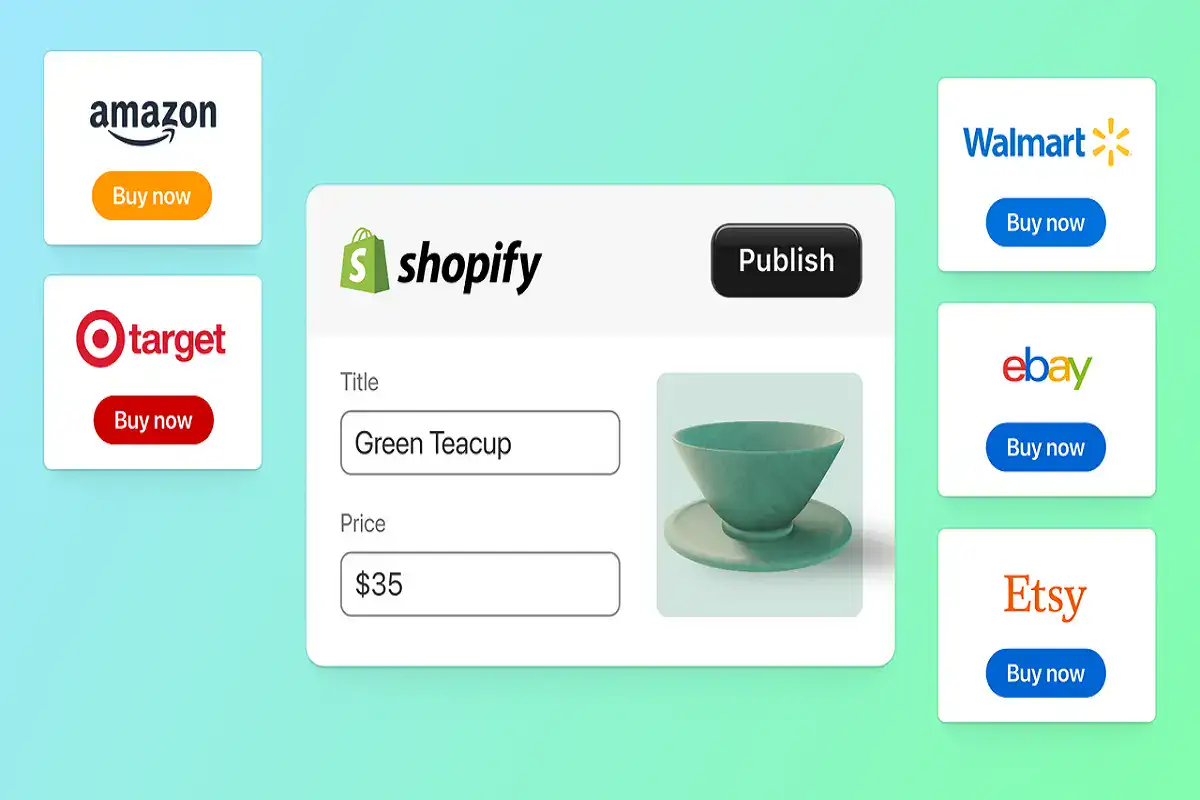Introduction
Shopify is a leading e-commerce platform that has revolutionized the way businesses build, operate, and grow online. Founded in 2006, Shopify provides entrepreneurs and companies with an easy-to-use platform to create online stores, manage products, handle payments, and streamline shipping processes. This article will explore the history of Shopify, its core features, how it helps businesses succeed, and why it is a top choice for those looking to start or expand their online presence.
History of Shopify
Shopify’s journey started when Tobias Lütke, a German programmer, and Scott Lake, a businessman, wanted to create an online store to sell snowboarding equipment. Dissatisfied with the existing e-commerce platforms at the time, they decided to build their own. By 2006, Shopify was born. What initially began as a simple tool to build an online store has now evolved into a fully customizable, robust e-commerce platform used by millions of merchants globally.
With a strong focus on user experience, Lütke designed Shopify to be easy to set up, eliminating the need for business owners to have advanced technical skills. Over time, the company introduced features such as integrated payment processing, mobile optimization, SEO tools, and app integrations, making it a comprehensive solution for modern entrepreneurs.
Shopify’s Rise to Prominence
As e-commerce grew in popularity during the late 2000s and early 2010s, value became even more apparent. It addressed a growing demand for simple yet powerful tools for launching online stores. Its flexibility, combined with strong customer support and continual updates, contributed to its widespread adoption.
In 2015, went public on the New York Stock Exchange, further cementing its status as a leader in the e-commerce space. The platform continued to expand its capabilities with new features and integrations, supporting its users in managing everything from dropshipping to large-scale enterprise operations.
Transitioning to the Future: Shopify in the 2020s
Shopify has remained at the forefront of e-commerce innovations, adapting to emerging trends such as omnichannel retailing, social media commerce, and mobile shopping. The platform continually updates to meet the changing needs of businesses in an ever-evolving digital landscape. During the COVID-19 pandemic, the importance of Shopify skyrocketed as brick-and-mortar stores closed, forcing businesses to shift online. Shopify played a critical role in helping these companies stay afloat by offering robust, easy-to-implement online solutions.
Core Features of Shopify
What makes such a powerful and popular platform is its feature-rich offering. Shopify includes everything you need to set up and run an online store, from product management to payment processing. Below are some of the core features of Shopify:
1. Ease of Use and Setup
Shopify is known for its ease of use, making it accessible to beginners who might not have any technical or coding knowledge. The platform offers a step-by-step guide to setting up your store, with customizable themes that can be tailored to your brand’s aesthetic. The process of adding products, setting prices, and configuring payment gateways is straightforward and intuitive.
2. Product Management
Managing your inventory is essential for any e-commerce business. offers a simple way to organize your products, create variants, and track inventory levels. You can also set up different product categories and collections, making it easy for customers to find what they are looking for. Additionally, Shopify allows for the seamless addition of digital products, services, and memberships.
3. Integrated Payments
Shopify Payments, the platform’s built-in payment processor, makes it easy for merchants to accept payments from customers. With support for credit cards, digital wallets like Apple Pay and Google Pay, and even cryptocurrency in some regions, Shopify ensures a seamless checkout experience. Additionally, Shopify integrates with third-party payment gateways, allowing for flexibility in payment options.
4. Mobile Optimization
As mobile shopping becomes increasingly dominant, having a mobile-friendly website is critical. themes are fully responsive, ensuring that your store looks great on any device, whether it’s a desktop, tablet, or smartphone. This optimization is crucial for businesses, as mobile shoppers make up a large portion of the e-commerce market today.
5. App Integration and Customization
Shopify boasts an extensive app marketplace, offering thousands of apps that extend the functionality of your store. Whether you need advanced reporting, marketing automation, dropshipping services, or customer loyalty programs, there’s likely an app for that. The platform also allows for extensive customization through its theme editor and custom code integration, enabling businesses to create a unique shopping experience.
6. SEO and Marketing Tools
Shopify provides built-in SEO tools to help businesses rank higher on search engines like Google. It automatically generates sitemaps, allows for meta tag editing, and optimizes product pages for search engines. Beyond SEO, Shopify integrates with social media platforms like Facebook, Instagram, and TikTok, allowing businesses to sell directly from these platforms. Shopify’s email marketing capabilities, promotional tools, and discount management help businesses engage their customers and drive sales.
7. Analytics and Reporting
For a business to succeed, understanding customer behavior and sales performance is critical. Shopify’s analytics dashboard gives merchants an in-depth look into key metrics like total sales, returning customers, and traffic sources. These insights can help businesses make data-driven decisions to improve performance and optimize marketing strategies. For advanced reporting, Shopify offers additional paid analytics features, which provide even deeper insights into business operations.
8. Customer Support
Shopify provides 24/7 customer support via chat, email, and phone. Its help center is filled with articles, tutorials, and forums where users can find answers to common questions or troubleshoot issues. Shopify also has a large community of experts and developers available for hire to assist with custom development and design needs.
Shopify and Business Success
The success of Shopify can be attributed to its ability to cater to a wide range of businesses, from small startups to large enterprises. Entrepreneurs benefit from its low barrier to entry, while larger businesses appreciate its scalability. Let’s explore how Shopify supports different types of businesses:
1. For Small Businesses
Small businesses, especially those just starting out, find Shopify attractive because of its low upfront costs and ease of use. The platform eliminates the need for expensive custom development and allows business owners to focus on growth rather than technical complexities. With its basic plan, Shopify offers a cost-effective way for small businesses to establish an online presence and begin selling products quickly.
2. For Medium-Sized Businesses
As businesses grow, their needs evolve. Shopify scales with these needs by offering advanced features in its higher-tier plans. Mid-sized companies can take advantage of features like abandoned cart recovery, advanced reporting, and more customization options to increase their revenue and optimize their store operations.
3. For Large Enterprises
Shopify Plus, the platform’s enterprise solution, is designed for large-scale operations that require additional support, higher levels of customization, and the ability to handle high volumes of traffic and transactions. Shopify Plus offers dedicated account managers, advanced API access, and priority customer support, making it a top choice for established brands.
The Shopify Ecosystem: Apps and Themes
One of the main advantages of using Shopify is its rich ecosystem of apps and themes. The Shopify App Store contains thousands of apps that extend the platform’s functionality, making it adaptable to nearly any business need. These apps cover a range of functions, including:
- Inventory management tools that streamline product management.
- Email marketing apps that help businesses engage with their customers through targeted campaigns.
- Social media integration, allowing for seamless selling on platforms like Instagram and Facebook.
- Dropshipping services that automate product sourcing and shipping.
On the design side, Shopify’s theme store offers a wide variety of professionally designed themes that cater to different industries and styles. Whether you’re selling fashion, electronics, or digital products, you can find a theme that suits your brand’s look and feel. Themes are also customizable, allowing businesses to tweak the layout, fonts, and colors to match their brand identity.
Why Shopify is the Best E-commerce Solution
While there are many e-commerce platforms available, Shopify stands out for several reasons. Its user-friendly interface, extensive app ecosystem, and powerful built-in features make it an ideal choice for businesses of all sizes. Below are some reasons why Shopify is the best e-commerce solution for modern businesses:
1. Scalability
Shopify is designed to grow with your business. Whether you’re just starting out or running a multi-million dollar enterprise, Shopify can handle your needs. Its ability to scale ensures that businesses don’t outgrow the platform as they expand.
2. Customizability
With thousands of apps and hundreds of themes, Shopify offers a high level of customization. Business owners can create a unique store experience that aligns with their brand’s identity and customer expectations. Additionally, for those with coding knowledge, Shopify’s platform is flexible enough to allow for extensive modifications.
3. Security and Reliability
Security is a top concern for online businesses, especially when handling sensitive customer data. Shopify is PCI compliant, ensuring that all transactions are secure and protected. Moreover, Shopify’s servers are fast and reliable, with minimal downtime, ensuring that your store is always available to customers.
4. Support and Resources
Shopify offers excellent support and resources to help businesses succeed. Its customer support is available 24/7, and the help center is filled with useful guides, tutorials, and troubleshooting articles. Additionally, Shopify’s large community of developers and experts can provide valuable support when needed.
5. Continuous Improvement
Shopify is always evolving. The company regularly releases updates, adding new features and integrations that keep businesses competitive. Whether it’s enhancing mobile functionality, expanding social media selling options, or improving payment processing, Shopify stays ahead of industry trends to ensure its users have the tools they need to succeed.
The Future of Shopify
As the world of e-commerce continues to grow, Shopify shows no signs of slowing down. The platform is constantly expanding its offerings and improving its technology to meet the demands of modern businesses. Some key areas of growth for Shopify include:
- Artificial Intelligence: Shopify is integrating AI to help businesses optimize operations, automate marketing, and provide personalized customer experiences.
- Social Commerce: As shopping on social media platforms like Instagram and TikTok continues to rise, Shopify is developing tools to help merchants seamlessly sell across these channels.
- Sustainability: With a growing focus on sustainability, Shopify is working on solutions to help merchants reduce their environmental impact and operate more eco-friendly businesses.
In conclusion, has revolutionized the way businesses approach e-commerce. Its comprehensive platform, filled with essential features, apps, and customization options, makes it an ideal choice for businesses of all sizes. With its continued innovation and dedication to helping businesses succeed, Shopify will remain a dominant force in the e-commerce world for years to come.



